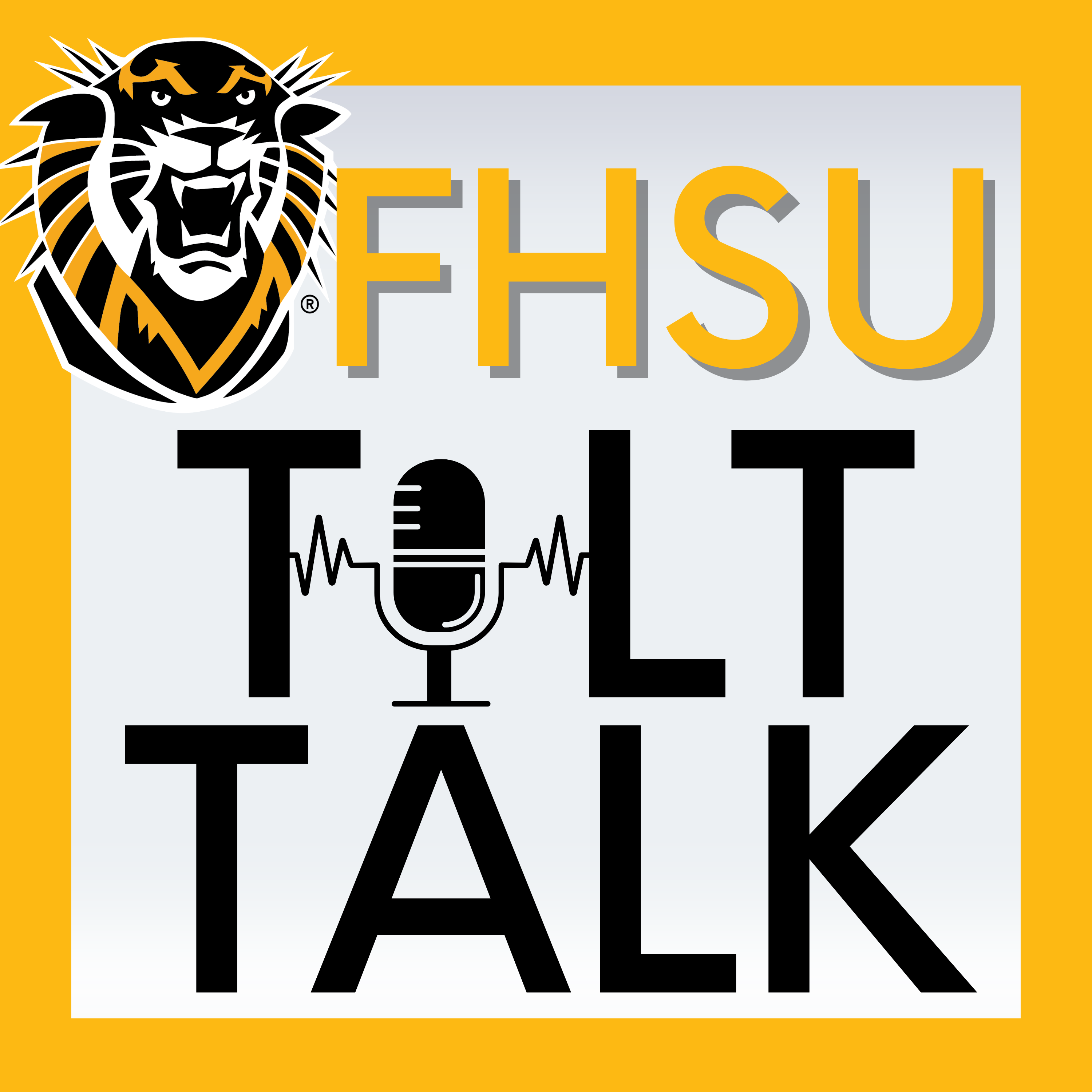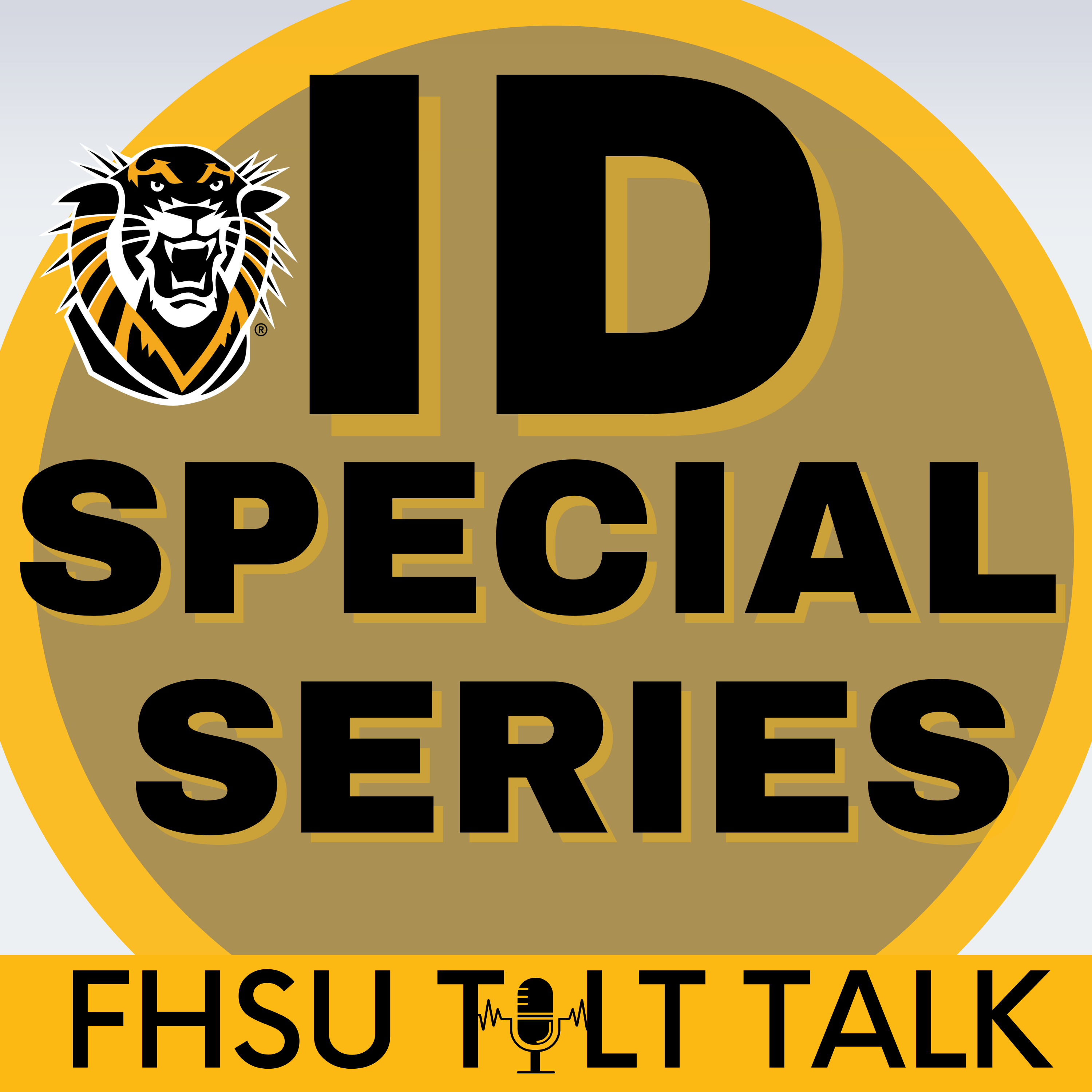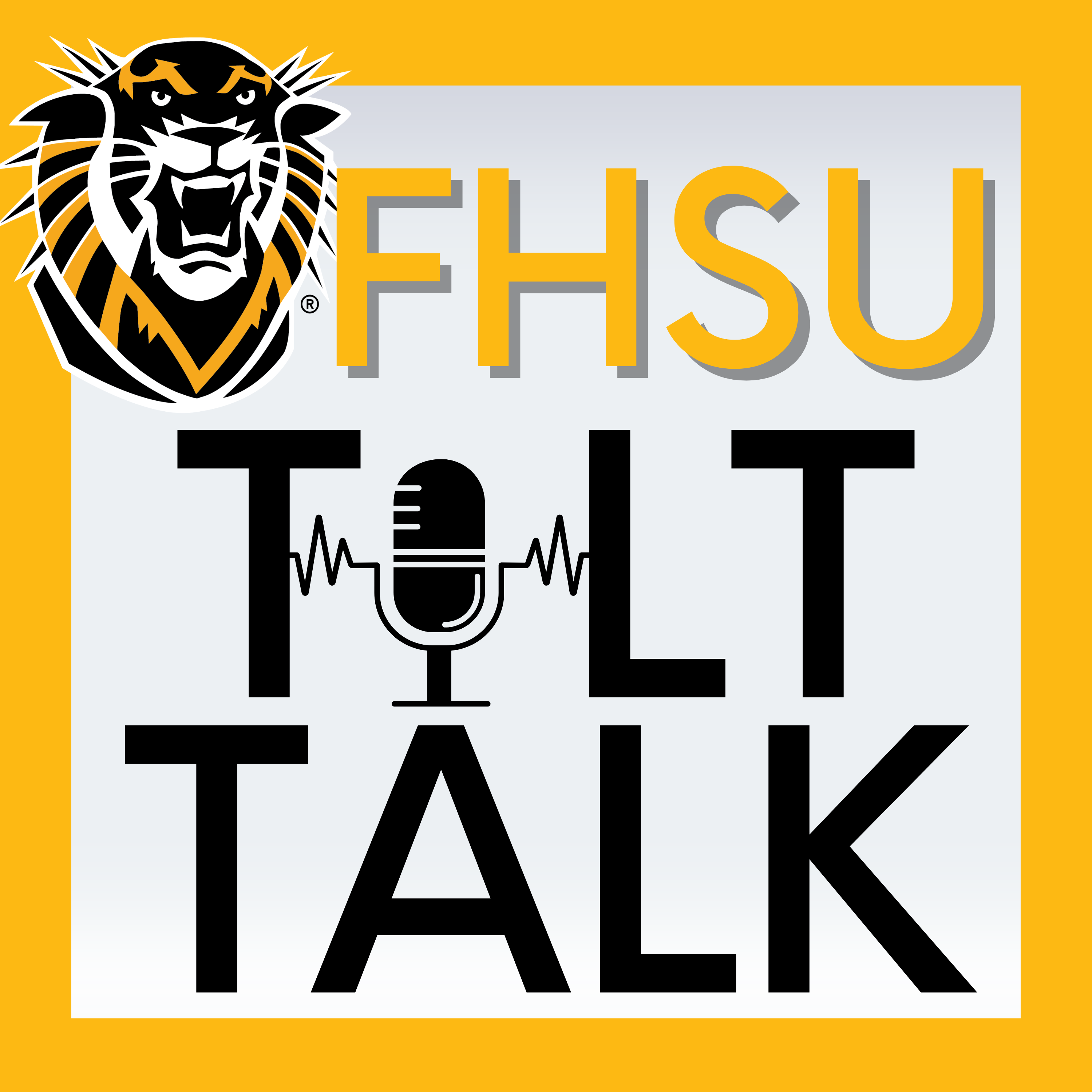Episode Transcript
Speaker 0 00:00:00 Welcome to F H S U Tilt Talk, a podcast about educational technologies, teaching and learning, scholarly research and service hosted by teaching innovation and learning technology staff.
Speaker 2 00:00:15 Thank you all for listening in on our Tilt Talk podcast. For this Tech Tuesday, we will be reviewing the ed tech tools we have in Fort Hayes teaching and learning ecosystem. I'm Magdalene Moy, an instructional technologist here in teaching Innovations and learning technologies, and I'm joined by my fellow instructional technologist, Nathan Rek.
Speaker 3 00:00:37 Hey all. Um, as we review these ed tech tools, Magdalene and I will be highlighting two initiatives we are working on here at Tilt. Uh, these are r s I also known as regular substantive interaction, uh, which you may be familiar with if you, um, attended our spring professional development day session. But, uh, we're also looking at social and collaborative wor learning. Now, what we really want you to take away from this episode, um, with just a, uh, few dots connected essentially. So basically if you like, hear RSI during a workshop or a meeting, maybe your brain will just go, oh, yeah, oh, I can facilitate RSI with like, pack back or discussion boards. You know, instead of, we we're not really trying to get you to think of every single tool, just maybe like a few like dots connected. Um, keep in mind you can always reach out to us for a consultation. We'll meet with you, determine your needs, and even find tools that best fit your courses. But mostly we just want everyone to keep RSI and social collaborative initiatives in mind.
Speaker 2 00:01:38 Exactly. These two initiatives are very important features of a quality course design, um, and in particular how to design quality online courses. So the key difference between these two initiatives that we're looking at is that rsi or regular, regular substantive interactions is that you, the instructor, are regularly interacting with your students in a meaningful way, or whereas the social collaborative learning, um, is where you create activities for your students to learn with and from one another.
Speaker 3 00:02:10 Right? Uh, th these can be a little tricky. Uh, so let's begin with collaborative learning, cuz it's a little bit straight more straightforward. Um, a common way we see faculty include social and collaborative learning is through discussion forums. And, uh, a lot of you are probably familiar with these. Uh, Blackboard has built in discussion boards where students can respond to their instructors posts and to one another. Um, if you use this tool in Blackboard Ultra, you can also pool student analytics on their critical thinking level, Lexile variation, and those are just a couple of the features that Blackboard's discussion board analytics have in Ultra,
Speaker 2 00:02:47 Right? And we have other tools for that as well. We also have Pack Back and Yellow Dig. Both of these are gamified tools, um, that can facilitate peer discussion between your students. The main difference between these two tools is that PAC Back encourages students to create prompts for their peers. While in Yeg, the instructor creates the prompt and the students reply to the prompt and then to each other. Both of these tools are AI supported and allow for a grade pass back to Blackboard, making it easier for you as the instructor with Pack Back. The AI encourages the students to ask critical thinking questions to their peers. They actually get more points towards critical thinking if they oppose harder questions to their peers. It does this by showing how deep their thinking is. Whereas with Yellow Dig, the AI will prompt the students to make sure that their posts and replies are meeting the standards that their instructors set out for them. So with Yellow Dig, you're setting up criteria that you want your students to have in their posts. That might be number of words. Um, and the same with their replies. We'll wanna return to Yellow Dig a little bit more when we discuss some tools for R S I.
Speaker 3 00:04:00 Yeah. Uh, yeah, let's just stick with collaborative like right now. Um, for collaborative, we also have feedback fruits, uh, which is a suite of tools, some of which are great for collaborative learning. Um, within feedback fruits, there are two discussion tools, uh, discussion on work and discussion on topic. Both of these tools allow the students to submit the replies in any number of formats, including video, audio, and even text. With discussion on work, students can discuss their submitted assignments with their peers while discussion on topic is prompted by the instructor. So unlike the aforementioned discussion tools, though, the feedback fruits tools do not let students go back to a post. Instead, these discussion boards are designed to be linear, whereas something like Pack Back or in Yellow Dig encourage a non-linear approach by having students tag posts. For example, if you discuss the concept of mitosis in module one, and again in module eight, the students can tag any post with mitosis and continue the conversations they were having way back at the beginning of the semester in module
Speaker 2 00:05:06 One. Yeah, so, so social collaborative learning isn't just about discussion board. Um, like I said, it's about engaging your students learning process with one another. So besides discussion tools, feedback, fruits also has tools for peer review, group member evaluation and team-based learning. So these are three different tools in their suite that all, um, revolve around social collaborative learning. Group member evaluation is particularly useful in courses where students work in groups. Uh, this particular tool allows students to rate one another's performance on a specific task. Group member evaluations can be conducted anonymously and with or without an associated grade passback their other tool. Peer review is fairly straightforward and allows students to rate each other's submitted work, um, based on, on a rubric that you would provide for them to be able to make that rating. The students can then reflect on their feedback and rate, which peers review was most helpful. And then they also have, like I said previously, team-based learning. This tool allows the instructor to test a student individually and in a group. So team-based learning basically gives an individual a test and the individual will take that exam or quiz or questionnaire, um, and then take it again with a group. And then team-based learning shows the individual what their score was as an individual and a group so that the student can see where their learning gaps are.
Speaker 3 00:06:40 Yeah, and we have plenty of other tools for collaborative learning, but I, I think we should probably move on to sri, uh, regular substantive interaction. What do you think? Sure. Yeah, that sounds good. <laugh> and, and remember, uh, unlike social collaborative learning, r s I is all about the meaningful interactions instructors have with their students. Um, we have many tools that can help facilitate rsi, but it ultimately comes down to the instructor to initiate and maintain. So, for example, instructors can use discussion boards as rsi, but in order for it to count as r s rsi, the instructor would need to draw on the student responses to be substantial. So I know a few instructors who not only comment on their student posts providing them feedback, but they'll also use the content of their students posts to prompt in-class discussions or reference it during their lectures.
Speaker 2 00:07:34 So it's important that we distinguish that a tool itself is not going to implement rsi, right? Because that has to be implemented by the instructor themselves. There are several things that you can do to set up your courses to include R S I, such as including an R S I statement in your syllabus and providing your students regular office hours regardless of whether or not they're online students or face-to-face students. But if you're interested more on that, I've linked our spring Professional Development day session in our podcast description, so you can access that, um, there for more information on RSI and how you can set up your course for that. As for RSI tools, let's go back to our feedback. Fruit Suite. Two options that you have in our feedback Fruits tool suite are assignment review and skill review. Both of these tools allow you to provide students specific feedback on either their submitted work or a particular skill like giving a presentation.
Speaker 3 00:08:34 Feedback. Fruits also has three interactive materials. Uh, these are interactive document, interactive video, and interactive audio. Each of these tools allows instructors to set up points in the video, like in the timestamp, um, in the audio or in the document where the students can be prompted to answer a quiz question, discuss the topic with their peers, or even just make a comment like, that's simple. You know, again, this alone is an R S I though. In order for this to count towards regular substantive interaction, the instructor would need to take those comments or quiz results and turn it into a discussion with their students. And remember, the goal with RSI is that you're giving your students substantive interaction.
Speaker 2 00:09:18 On a similar note, you can use discussion boards for RSI as well where this instructor is giving meaningful feedback to the students by replying to their post. So I wanna return notes to Yellow Dig where instructors have the opportunity to give students badges or accolades. While this is great, uh, teaching practice, this does not count towards RSI because you're not giving the students that substantive feedback of interaction for it to be considered rsi. What you'd have to do is give the students more substantive feedback on their posts or like, uh, Nathan mentioned earlier, you can bring that whatever the content of the student's post is into a in-class discussion or a lecture or somewhere else so that it's, um, substantive feedback for the individual student. I also wanna take this opportunity to say that again, there's lots of things that you can do that are not going to fall into these two categories that we've been talking about.
Speaker 2 00:10:18 Social collaborative learning and regular substantive interaction. Just because what you're doing does not count as social collaborative learning or R s I, doesn't mean that what you're doing is bad. Um, there's lots of pedagogies and best practices for teachings that aren't gonna fall into this, and you should definitely still include those in your classes. Um, these are just two initiatives that Tilt is working on. Um, and we wanna share them with our Forte's, um, community and use 'em as a frame for what we're thinking about and how you can think about the EdTech tools that we offer. I think now as your two instructional technologists at Fort Hayes, um, Nathan and I will give you some opinion pieces on our EdTech tools that we offer. So first question, Nathan. Mm-hmm. <affirmative>, what's your favorite EdTech tool for social collaborative learning?
Speaker 3 00:11:13 Probably feedback. Fruits honestly, with, um, their interactive materials. I like the idea of actually providing that content to students and not figuratively, like pedagogically wise, centering the discussion on that topic, literally centering the discussion on your course content. I think that's fantastic and I think it's something that should be used a lot more, um, just to try to get students more engaged with content. What about you? How would, what would you pick for your social collaborative tool, your favorite one?
Speaker 2 00:11:47 I've recently, um, been trying to use and promote to other instructors to use in space for social collaborative learning. So in Space is already an l t i in our Blackboard, so you can just pull it directly into your class. And I think this is really a good use case if you do group work at all because basically you can set up these different rooms, you know, tag the rooms with groups, have the group members go into that room and they can pull in any Google Suite tool that they want. So either slides or docs or sheets, and they can work there in real time and that room stays open for them 24 7. They can go in at any time with or without their other peers, with or without their instructor and work on their project. So you can basically set up group workspaces, um, in a virtual space that they can always have access to, which is really cool. And you as the instructor, as long as you have a Gmail account, um, can see what they're working on anytime you enter that space. So I really like that as a, a way for both face-to-face and online courses to facilitate social collaborative learning.
Speaker 3 00:13:03 No, in Space is fantastic. Um, I mean once you give people agency, they love using those little like, features that are in there, don't they? <laugh>?
Speaker 2 00:13:13 Yeah, I like it <laugh>. I like it. So what's your favorite RSI tool?
Speaker 3 00:13:18 Tool? I'm gonna go ahead and go with quickly. Um, as we've discussed, uh, RSI is all about instructor initiated communication, substantive of course. And what I like about quickly is that quickly allows you to do messages, announcements, um, to all your courses. Some of your courses, just one of your course. It's a real time saver. So if you need to post an announcement to maybe four or five different sections of your course, you can do it through quickly and have it all go to all those courses at once. It's a real time saver. Um, I, I really think that once faculty learn to use it, they really like leveraging what it can do for them. How about you once you got for RSI your favorite?
Speaker 2 00:14:04 I have a little cheat. Um, I think my favorite <laugh> my favorite RSI tool is not a tool. Um, so sorry, but I really like setting up one-on-one meetings with my students as a way to create a mandatory, um, feedback session with them. Because even though you can offer students office hours, um, many of them don't take advantage of it and they don't know what they don't know. So just sitting down with them and requiring them to, you know, even for five minutes, just share a little bit with you, makes them more likely to give you ask questions in the future and hopefully, um, you know, know, participate more in class. So you can use any, any tool <laugh> you want for this zoom in space. There's lots of things that you can do for this, your own office room in physical space. Um, but I would say that one of the most meaningful ways to get that regular substantive interaction is to have that one-on-one relationship building opportunity with your students.
Speaker 2 00:15:16 That's my cheat for R S I. So that brings us to the end of our little episode. Um, thank you all for tuning in to Tech Tuesday. Just a reminder, you do not need to memorize any of these tools that we have just said to you. Um, we just wanted to highlight that we do have tools for social collaborative learning and R s I. If you have any questions about these tools, you wanna learn more about these tools, I would highly recommend you check out our Tilt blog where we have our tools listed and available for you. You can also set up a consultation with myself or Nathan as your friendly F H S U uh, instructional technologist. I'm Magdalene Moy,
Speaker 3 00:16:02 I am Nathan Reddle. See you next time. Everyone.
Speaker 0 00:16:04 Thank you for listening to this episode of F H S U Tilt Talk. Subscribe on Spotify, Amazon, and Google Podcast. In the meantime, check out the Tiger Learn blog or the tilt social media pages for updates. We'll see you next time.


